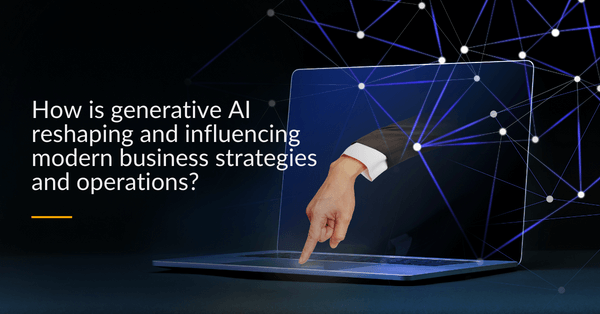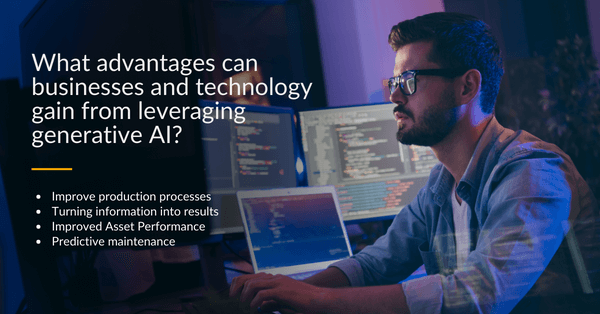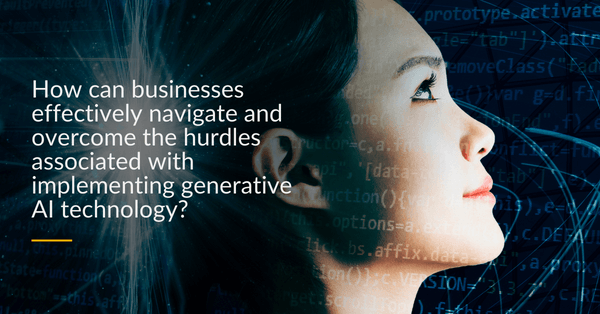Generative AI: the catalyst reshaping industries, propelling businesses into a new era of innovation. As technology evolves, so does its transformative power, and generative AI stands at the front of this revolution. With its ability to create, learn, and adapt, generative AI is revolutionizing the way we approach business and technology. From automating simple tasks to unlocking creativity beyond our imagination, its impact is far-reaching. In this blog post, we dive into the influence of generative AI on various industries, exploring how it is redefining the boundaries of what is possible. Join us as we uncover the limitless potential of generative AI and its game-changing implications.
Understanding the impact of generative AI on businesses

In today’s world, generative AI is empowering organizations to streamline operations, enhance productivity, and drive growth.
By providing personalized customer interactions and predicting consumer behavior, businesses can deliver tailor-made solutions, increasing customer loyalty and satisfaction.
Generative AI’s ability to analyze large amounts of data allows companies to make data-driven decisions, identify new market opportunities, and optimize processes for improved efficiency.
With the ability to generate realistic data, organizations can test various scenarios, predict outcomes, and strategize accordingly.
This not only saves time and resources but also enables businesses to stay ahead of the competition.
Moreover, generative AI enables businesses to automate mundane and repetitive tasks, freeing up human resources to focus on more strategic and creative endeavors.
From automating customer support through chatbots to generating content and designs, generative AI is revolutionizing the way businesses operate.
However, implementing generative AI in business comes with its challenges. One of the main concerns is the ethical implications of using AI-generated content or interactions.
Ensuring transparency and accountability is crucial to maintaining trust and avoiding potential legal issues.
Organizations must also invest in robust data security measures to protect sensitive information and prevent misuse.
The benefits of using generative AI in business and technology

As Plain Concept mentions, AI has been transforming and generating new business opportunities in a number of sectors for years. The advent of generative AI has created new and has begun to change industrial operations. Below are a few examples:
1. Improve production processes:
Generative AI can automate tasks that were previously done manually or programmatically through rules. It can optimize production scheduling, resource allocation, and inventory management, improving operational efficiency and reducing costs.
2. Turning information into results:
Generative AI is capable of converting text into code or images to speed up manufacturing-related processes. For example, process automation creates programming codes when entering text.
3. Improved Asset Performance:
From reliability analysis to risk management, a large amount of data is generated, which can make it difficult to access the necessary information quickly. Generative AI can produce context-sensitive answers and explanations, eliminating the need for data engineering or coding skills with only an NPL processing user interface.
4. Predictive maintenance:
Generative AI can produce new patterns of failures that may not be found in history but could occur. This allows for more accurate predictions and adaptive maintenance plans that go beyond traditional systems.
Real-world examples of generative AI applications

Generative AI is already being used in various real-world applications. One notable example is the use of generative AI in the fashion industry.
By training AI models on vast amounts of fashion data, companies can generate unique designs, predict fashion trends, and personalized recommendations for customers.
This not only increases customer shopping experience but also helps designers and retailers stay ahead of the fashion trends.
Another example is in the field of content creation. Generative AI can generate written content, including articles, blog posts, and social media captions.
This saves time for content creators and marketers, allowing them to focus on other aspects of their work. However, it is important to note that human oversight and editing are still important to ensure quality and accuracy.
Generative AI is also being used in the gaming industry to create realistic virtual environments and characters.
By training AI models on existing game assets, developers can generate new content, improve graphics, and create immersive gaming experiences.
These examples demonstrate the versatility and potential of generative AI in various industries.
As the technology continues to advance, we can expect even more innovative applications in the future.
Overcoming challenges with implementing generative AI

As Damco mentions, Implementing Generative AI can be transformative in the fast-changing business landscape but it comes with a set of challenges that must be addressed for successful implementation and to leverage its full potential. Here are the challenges, along with the corresponding solutions, that businesses need to consider when implementing this disruptive technology:s
1. Data Privacy and Security:
One of the key challenges that businesses may face when embracing this transformative technology is data privacy and security. Generative AI relies heavily on large volumes of datasets to produce meaningful and accurate results, however handling sensitive or proprietary data can pose security and privacy concerns.
To overcome this critical issue, businesses need to make sure that they strictly adhere to ethical guidelines and ensure compliance with data protection laws to safeguard sensitive data from potential breaches.
In addition, robust data governance policies and practices, including strong encryption methods and data anonymization techniques, are crucial to prevent data breaches and maintain compliance.
For instance, if a healthcare institution wants to employ Gen AI models to predict patient outcomes based on medical records, it must anonymize data to maintain data confidentiality whilst ensuring compliance with regulations like HIPAA.
2. Integration With Existing Systems:
Integrating this disruptive technology with existing workflows and business processes can be a challenging task since it requires changes in workflows and strong technical know-how to enable AI models to interact with existing systems.
This may lead to resistance among the workforce.
To overcome the issue, businesses need to develop a change management strategy that involves necessary training to overcome the fears or concerns that employees may have.
When providing training, emphasize the value that Generative AI models can bring not only to the business but also to individual roles
3. Ethical and Bias Considerations:
Generative AI learns from the input data and if the training data that is fed into the system is biased, the output generated by the AI models will also be biased.
This may lead to discriminatory or unfair results that may damage a brand’s reputation. In other words, in businesses where transparency is critical, biased outcomes can be a major barrier to AI adoption.
Therefore, it makes sense to address these ethical concerns to ensure inclusivity and fairness in generated outcomes.
To tackle the challenge, businesses must use unbiased data sets when training AI models and regularly test and monitor the generated outputs to determine any sign of bias or discrimination.
Incorporating ethical and bias considerations into the implementation strategy is critical for responsible AI deployment.
For instance, if an insurance company wants to employ Generative AI that can help them automatically assess damages and calculate claims, they must train the AI model with distinct datasets so that the generated output is unbiased and provides a coherent explanation of its decision-making process.
Conclusion
In conclusion, Generative AI stands as a transformative force, reshaping industries, and redefining the boundaries of innovation. Its impact on business and technology is obvious in the evolution of processes, creativity, and problem-solving. As organizations utilize the power of Generative AI and push themselves into the front of their respective field.
Do you use Generative AI? If so, what are your thoughts on these impacts on Business And Technology?
Let me know in the comments below.
As always, if you have any questions don’t hesitate to contact us here.

Before you go, I want to offer you something. Automate You is a done-for-you service where we help you maximize your marketing and sales effectiveness by streamlining manual, tedious, and time-consuming tasks in the sales process so you can focus less on the admin work and more on selling. It will save your business time and money and make your business more effective.
We guide you through the process and help you set up the right tools for your company and price point so you can stay focused on things that matter – building your business and making huge sales.
This program is right for you if you are:
- Someone who already has a business but needs help converting their leads to paying customers
- Someone who is having a lot of new business but is struggling to keep up with managing all the leads and tasks
- Someone who has a lot of leads but doesn’t know how to keep up with the details of each customer
- Someone who needs help managing your old and new leads and maintaining them as customers
You can read more about it here.






0 Comments